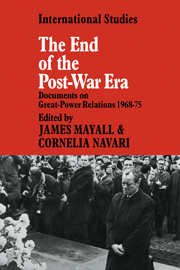Book contents
- Frontmatter
- Contents
- Preface
- Source Abbreviations
- Note on the texts of the documents
- Introduction
- I THE END OF THE COLD WAR
- II THE DIPLOMACY OF DETENTE
- III CHANGES IN THE WESTERN ALLIANCE
- IV THE WARSAW TREATY ORGANISATION
- V THE GREAT POWERS AND THE MIDDLE EAST WAR OF OCTOBER 1973
- THE GREAT POWERS AND THE MIDDLE EAST WAR OF OCTOBER 1973
- VI THE CRISIS OF THE INTERNATIONAL ECONOMIC ORDER
THE GREAT POWERS AND THE MIDDLE EAST WAR OF OCTOBER 1973
Published online by Cambridge University Press: 07 October 2011
- Frontmatter
- Contents
- Preface
- Source Abbreviations
- Note on the texts of the documents
- Introduction
- I THE END OF THE COLD WAR
- II THE DIPLOMACY OF DETENTE
- III CHANGES IN THE WESTERN ALLIANCE
- IV THE WARSAW TREATY ORGANISATION
- V THE GREAT POWERS AND THE MIDDLE EAST WAR OF OCTOBER 1973
- THE GREAT POWERS AND THE MIDDLE EAST WAR OF OCTOBER 1973
- VI THE CRISIS OF THE INTERNATIONAL ECONOMIC ORDER
Summary
Statement by the Soviet Union on the situation in the Middle East, Moscow, 7 October 1973
The absence of a political settlement in the Middle East has resulted in military operations flaring up there again, involving loss of life, calamities and destruction.
The peoples of the world, who responded with feelings of relief to the process of international detente which had started recently, are again faced with a dangerous development of events.
It is no secret from anyone that the cause of this situation in the Middle East is the expansionist policy of Israel's ruling circles.
Enjoying the support and patronage of imperialist circles, Israel, for a number of years now, has been constantly heating up the situation in the Middle East by its senseless aggressive actions. Ignoring the demands of world public opinion and of most of the world's States and trampling on the Charter and resolutions of the United Nations and the generally-accepted standards of international law, the Israeli ruling circles have raised violence and piracy to the level of their State policy.
Frustrating all the efforts aimed at establishing a just peace in the Middle East and committing constant provocations against neighbouring Arab States, the Israeli military have gone on fanning in every way the smouldering embers of the military conflict in that area unleashed by Tel Aviv in 1967.
The endless armed provocations of the Israeli military against Egypt, Syria and Lebanon have repeatedly created critical situations in the area.
- Type
- Chapter
- Information
- The End of the Post-War EraDocuments on Great-Power Relations 1968-1975, pp. 535 - 564Publisher: Cambridge University PressPrint publication year: 1980



